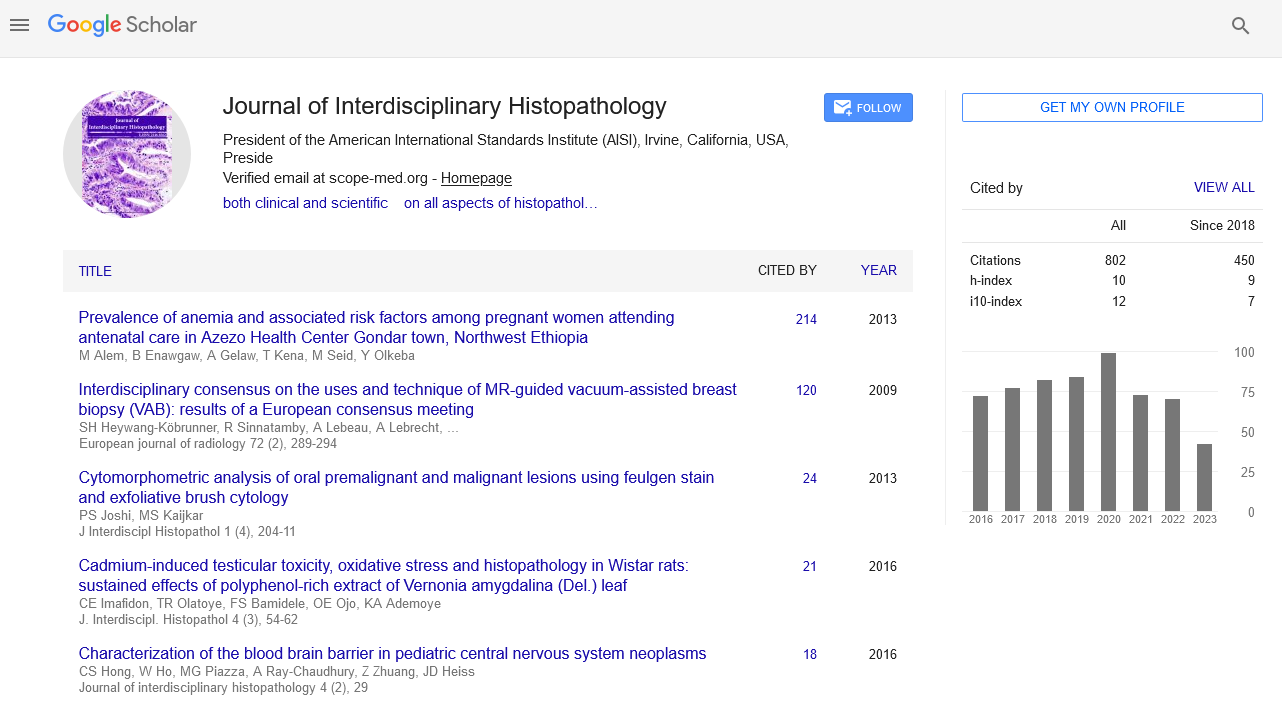Opinion - Journal of Interdisciplinary Histopathology (2024)
Adult Stem Cells Play Essential Roles in Tissue Homeostasis, Repair, and Regeneration
Allende Orwell*Allende Orwell, Department of Pathology, University of Gothenburg, Gothenburg, Sweden, Email: aysenuraydin2016@gmail.com
Received: 13-Feb-2024, Manuscript No. EJMJIH-24-135222; Editor assigned: 16-Feb-2024, Pre QC No. EJMJIH-24-135222(PQ); Reviewed: 04-Mar-2024, QC No. EJMJIH-24-135222; Revised: 11-Mar-2024, Manuscript No. EJMJIH-24-135222(R); Published: 18-Mar-2024
About the Study
Adult stem cells, also known as somatic stem cells, play indispensable roles in the maintenance and repair of tissues throughout the human body. These cells, found in various tissues such as the bone marrow, brain, liver, and skin, are essential for preserving the delicate balance of cell production and turnover, known as tissue homeostasis. Their ability to self-renew and differentiate into specialized cell types makes them critical for both daily cellular maintenance and in response to injury or disease. This article searches into the fundamental roles of adult stem cells in tissue homeostasis, repair, and regeneration.
Tissue homeostasis: Maintaining balance and function
Tissue homeostasis refers to the body’s ability to maintain a stable internal environment despite external changes. This balance is achieved through the regulation of cell production, differentiation, and death. Adult stem cells are pivotal in this process. For instance, Hematopoietic Stem Cells (HSCs) in the bone marrow continuously produce new blood cells to replace those that are lost to aging or injury. Similarly, intestinal stem cells replenish the epithelial lining of the gut, which undergoes constant wear and tear.
The capacity of adult stem cells to generate new cells is tightly regulated by intrinsic genetic factors and extrinsic signals from their microenvironment, or niche. Disruptions in this regulation can lead to diseases such as cancer, where uncontrolled cell proliferation occurs, or degenerative conditions, where there is insufficient cell production.
Repair: The first responders to injury
When tissues are damaged, adult stem cells are among the first responders to initiate repair processes. This is evident in muscle tissue, where satellite cells, a type of adult stem cell, activate and proliferate in response to injury. These cells differentiate into myoblasts that fuse to form new muscle fibers, thereby restoring tissue integrity and function.
In the skin, epidermal stem cells are essential for wound healing. Upon injury, these cells migrate to the wound site, proliferate, and differentiate into various cell types needed to reconstruct the epidermis. This rapid response is crucial for protecting the body from infection and further damage.
Regeneration: Beyond simple repair
Regeneration goes beyond mere repair to the complete restoration of a tissue or organ to its original state. While mammals generally have limited regenerative abilities compared to organisms like salamanders, adult stem cells still play a significant role. The liver, for instance, has a remarkable capacity for regeneration, largely due to its resident stem cells. After substantial loss of liver tissue due to surgery or injury, these stem cells can proliferate and differentiate to restore the organ’s mass and function.
Cardiac stem cells, although less understood, hold promise for regenerating heart tissue after a myocardial infarction (heart attack). Research is ongoing to harness these cells’ potential to repair heart damage, which is traditionally thought to be irreversible.
Therapeutic potential: The future of regenerative medicine
The unique properties of adult stem cells have significant implications for regenerative medicine and therapies. Scientists are exploring ways to manipulate these cells to treat a variety of conditions, from neurodegenerative diseases like Parkinson’s and Alzheimer’s to spinal cord injuries and diabetes.
One potential approach is the use of Mesenchymal Stem Cells (MSCs), which can be isolated from bone marrow, fat tissue, and other sources. MSCs have shown potential in modulating immune responses and promoting tissue repair, making them candidates for treating inflammatory and autoimmune diseases.
Moreover, advances in gene editing technologies, such as CRISPR/CAS9, offer the potential to correct genetic defects in stem cells before that are transplanted into patients. This could prepare the way for personalized medicine, where a patient’s own stem cells are modified to treat their specific conditions, minimizing the risk of immune rejection.
Challenges and ethical considerations
Despite the promise, several challenges remain ensuring the safety and efficacy of stem cell therapies is important, as improperly regulated stem cells could lead to tumor formation. Additionally, ethical considerations surrounding the source and use of stem cells continue to be a topic of debate, although adult stem cells typically present fewer ethical issues compared to embryonic stem cells.
Adult stem cells are indispensable for the maintenance, repair, and regeneration of tissues. Their ability to respond to the body’s needs and their potential in therapeutic applications highlight the importance of continued research in this field. As our understanding of these remarkable cells grows, so too will the possibilities for innovative treatments that could one day revolutionize medicine and improve countless lives.






